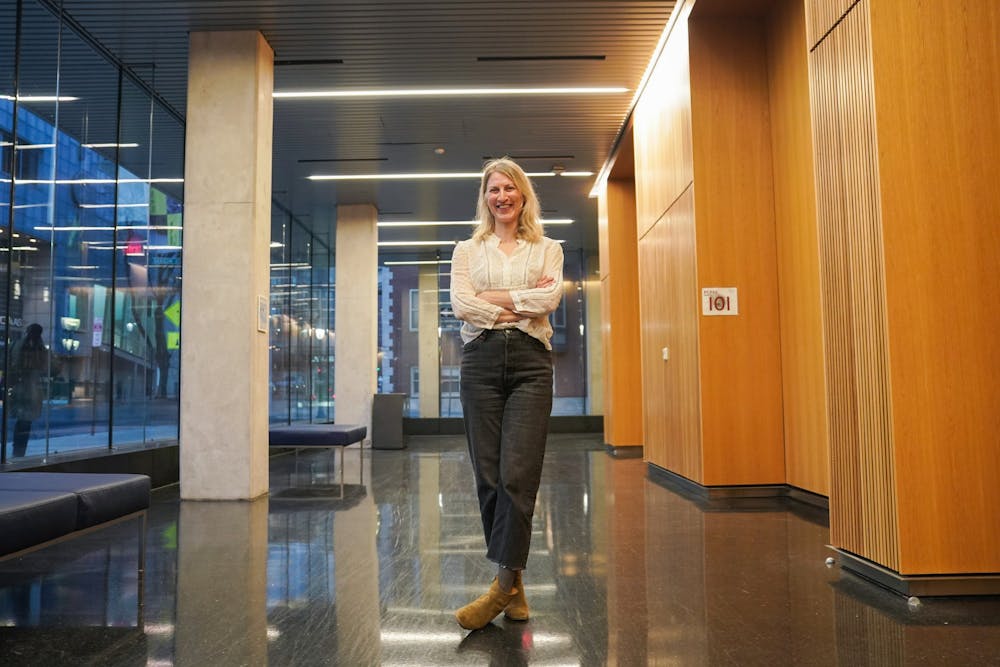Long before professor Anne Duchene taught economics at Penn, she played bass guitar in a band. “I wanted to be a rock star,” she says, shifting aside a stack of exam sheets on her desk.
It's the evening of the ECON 0100 midterm. Across the street from Duchene’s office in the Perelman Center for Political Science and Economics building, nearly 200 students are preparing to test their knowledge on everything from comparative advantage to price elasticity. Although the size of her spring class might seem large, Duchene taught three times that many students during the fall semester for her Introduction to Microeconomics course, as she has done every year since 2015.
Duchene is one of the most widely known professors on campus. Over 600 students enroll in ECON 0100 every fall—a mix of prospective economics majors, first years exploring their interests, and non–majors fulfilling general education requirements. Duchene is many students’ leader in their exploration of the economics department at Penn. She lectures to a crowded hall every Monday and Wednesday, and so many first years take her class that their Class Board organizes the "Econ Scream" the night before the first fall semester midterm.
But Duchene’s path to university teaching was far from linear.
After her dreams of rock stardom fell through, Duchene began pursuing an undergraduate degree in France—where students had to declare their majors as soon as they started college. With little time to explore her interests, Duchene chose architecture, but she soon realized that it wasn’t her passion and dropped out after a year. “I had to start all over again as a freshman in something else,” says Duchene. “And I was just wondering, what should I do?”
Her father, noticing her affinity for math and writing, gifted her a microeconomics textbook. As Duchene read, she found herself fascinated by ideas such as analyzing consumer behavior, managing budgets, and maximizing utility. “That really spoke to me, because it was about me and every human being in their everyday life,” she says.
This time, when she started again as a first–year student in economics, “it clicked.” After graduating from Sorbonne University, Duchene completed a PhD in economics. While she found the research process isolating, she discovered her enjoyment of the interpersonal aspects of teaching through her work as a teaching assistant. “You actually have a lot more interactions and you transmit something directly to the students,” she says. “And the students also teach me a lot.”
Duchene began her career as a lecturer at the University of British Columbia and Drexel University. Upon transitioning to Penn, she experienced teaching such a huge class for the first time—and she found it difficult to maintain those interactions with her students. “It’s like a big ship, and you have to know where it’s going, because if it changes route then everybody is lost,” she says.
Yet even with hundreds of students, Duchene works to forge personal connections. She welcomes students to her office and wants them to feel comfortable speaking with her—the polar opposite of her undergraduate experience in France, she notes, where professors neither held office hours nor learned their students’ names.
“Any personal interaction I have makes me so happy,” she says.

Part of Duchene’s objective is to make her lectures engaging for all of her students, including those who don’t plan to major in economics. She connects classroom concepts to real–world applications and regularly updates the textbook to reflect current events. Since students enter her class with varying levels of comfort with math, she aims to impart the “intuition behind the equations.”
During COVID–19, she incorporated group work into recitation and increased the number of assignments to give students regular practice. “I experiment a lot,” she says. “[The class] is changing constantly, and I think it has to.”
While Duchene is aware of the pre–professional environment at Penn, she's also optimistic that students here seek knowledge beyond the purposes of an internship or career path. “Not only are the students extremely smart and extremely driven, but they are also eager to learn,” she says. “Not necessarily for their future jobs, but just for further knowledge. It’s a luxury to teach this type of student.”
So, she urges students to take full advantage of Penn’s diverse course offerings, even if the subject lies outside their vision of “one path” to success. When Duchene studied at the Sorbonne, she found it frustrating that she could only take courses within her major. “Enjoy your classes, because you’re so lucky to be an undergrad and have so much choice in the classes you’re taking,” she says. “Just learn everything.”
As the interview finishes, Duchene glances at her phone. The midterm is underway, and TAs are messaging her about a question on the exam. Many of the students in her current ECON 0100 class will never take another economics course at Penn after this semester, but Duchene hopes that students of all interests will at least leave her class with “good memories,” bringing economic thinking to their everyday life, work, or other classes.
“Just telling me that they learned something and they discovered economics … it’s already a huge success,” Duchene says. “Regardless of what they do after that.”







